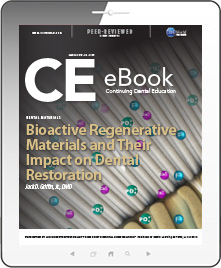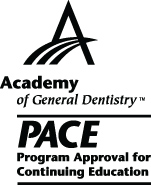CDEWorld > eBooks > Bioactive Regenerative Materials and Their Impact on Dental Restoration


ADA CERP is a service of the American Dental Association to assist dental professionals in identifying quality providers of continuing dental education. ADA CERP does not approve or endorse individual courses or instructors, nor does it imply acceptance of credit house by boards of dentistry. Concerns or complaints about a CE provider may be directed to the provider or to ADA CERP at www.ada.org/cerp/

Approved PACE Program Provider. FAGD/MAGD credit. Approval does not imply acceptance by a state or provincial board of dentistry, or AGD endorsement. 1/1/2023 to 12/31/2028. ID # 209722.
eBook
Released: Thursday, April 11, 2019
Expires: Saturday, April 30, 2022
Bioactive Regenerative Materials and Their Impact on Dental Restoration
By Jack D. Griffin, Jr., DMD
Commercial Supporter: Shofu
This article covers bioactive regenerative materials and how they may create new opportunities for restorative dentistry. These materials may offer advances that go beyond the merits of glass-ionomers. The article describes bioactive materials in relation to healing, acid neutralization, and prevention of further damage. Specific materials covered include resin-modified glass-ionomer cement, Giomers, bioactive composites, and bioactive ceramics. The article also briefly describes how to use bioactive materials in specific cases.
LEARNING OBJECTIVES:
-
Discuss how to create a regenerative environment.
-
Review problems with posterior composites and how to circumvent them.
-
Discuss advances in dental materials that promote tissue repair.
About the Author
Jack D. Griffin, Jr., DMD
Private Practice
Lake St. Louis, Missouri


